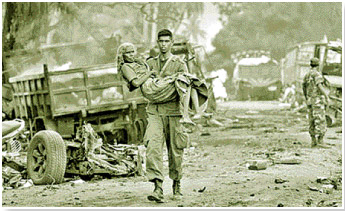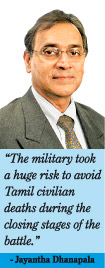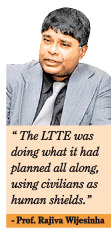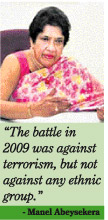|
Former diplomats tell LLRC:
Int’l Community kept mum on LTTE atrocities
By Shanika SRIYANANDA
|

Carrying a civilian to safety
|
Some of Sri Lanka’s top former diplomats blamed the International
Community for assisting the LTTE and being silent when the terrorists
committed grave crimes and conscripted underaged children to the outfit.
Former Ambassador and Permanent Representative of Sri Lanka to the UN
Jayantha Dhanapala said the Forces should not be charged with war crimes
when they launch offensives against terrorists.
The former UN diplomat commended the Sri Lankan military for saving
over 300,000 civilians from the grip of LTTE terrorism, but blamed the
International Community for harbouring terrorists on their soil.
Giving evidence at the eight-member Lessons Learnt and Reconciliation
Commission (LLRC), Dhanapala said the Sri Lankan military took a huge
risk to avoid Tamil civilian deaths during the closing stages of the
battle that defeated the LTTE, which had kept civilians as a human
shield.
He said the tragedy would have reached alarming proportions if the
Forces had not exercised restraint during attacks to avoid civilian
casualties.
He said at a time the country was facing international criticism
after ending terrorism, it was time for the country to push for new
guidelines. He also called for international consultation among Member
States of the UN and other stakeholders such as NGOs to work out a
mechanism.
 The former Secretary-General for Disarmament Affairs of the UN
Dhanapala said that some sections of the international community
interfere in the affairs of other countries by aiding and abetting
terrorism, funding terrorists, promoting terrorism and allowing funds
from those countries to be used for supporting terrorist organisations. The former Secretary-General for Disarmament Affairs of the UN
Dhanapala said that some sections of the international community
interfere in the affairs of other countries by aiding and abetting
terrorism, funding terrorists, promoting terrorism and allowing funds
from those countries to be used for supporting terrorist organisations.
“It is the responsibility of the international community to work for
the protection of nations victimised by the export of terrorism. The
international community should also take action against countries
assisting terrorism in other countries. Such interference is a clear
violation of the principle of non-interference in the internal affairs
of other countries”, he said.
He said that the international community should adopt a new protocol
to deal with the Armed Forces battling terrorism spearheaded by
non-State actors.
 Emphasising that terrorism could not be justified, the veteran
diplomat said that international humanitarian laws were based on the
assumption that the warring parties were conventional armies of States,
but in Sri Lanka, the military was fighting a terrorist organisation
which had completely disregarded those rules and laws and used suicide
cadre, underaged children as soldiers and civilians as a human shield. Emphasising that terrorism could not be justified, the veteran
diplomat said that international humanitarian laws were based on the
assumption that the warring parties were conventional armies of States,
but in Sri Lanka, the military was fighting a terrorist organisation
which had completely disregarded those rules and laws and used suicide
cadre, underaged children as soldiers and civilians as a human shield.
Dhanapala, who served in London, Beijing, Washington D.C. and New
Delhi before his tenure as the UN Ambassador, said that Sri Lanka should
initiate a dialogue with the international community on the subject of
counter-terrorism in the post-war era.
Proposing the concept of Responsibility to Protect (R2P) to enhance
new innovative ideas to assist vulnerable nations faced with
difficulties in their fight against terrorism unleashed by non-State
actors, he said : “There are many members of the Non Aligned Movement
faced with this situation. They will support it if there is a move to
improve the provisions in the R2P concept to safeguard such nations”.
Dhanapala said that those who sponsored terrorism should take the
responsibility for the situation it had created, as in the case of Sri
Lanka. Those who had facilitated the LTTE to receive funds, too, were
equally responsible for Sri Lanka’s misery.
Good governance
He said all political parties should extend a joint apology to the
nation for their failure to establish good governance and to bring in
reconciliation in society and urged the Government to bring a Race and
Religious Relations Act to promote reconciliation.
 “President Rajapaksa’s laudable ‘Mathata Thitha’ has brought in good
results. Now that the conflict is over, the Government should launch a
program, ‘Aviyata Thitha’ to prevent the proliferation of unauthorised
small arms and light weapons in the Sri Lankan society,” the former
diplomat said. “President Rajapaksa’s laudable ‘Mathata Thitha’ has brought in good
results. Now that the conflict is over, the Government should launch a
program, ‘Aviyata Thitha’ to prevent the proliferation of unauthorised
small arms and light weapons in the Sri Lankan society,” the former
diplomat said.
Dhanapala, emphasising the importance of teaching both Sinhala and
Tamil languages from the primary school level said: “When a person is
addressed in his their own language, it is easier to build trust and
confidence. Other political leaders should emulate President Mahinda
Rajapaksa’s practice of speaking in Tamil, whenever it is necessary”.
He was of the view that people’s opinions should be taken into
consideration when bringing Constitutional reforms. “To begin with, the
APRC proposals should be published together with new proposals so that
widespread consultations could take place,” he said.
The Sri Lankan Commission on Lessons Learnt and Reconciliation,
appointed by President Mahinda Rajapaksa, commenced its sittings at the
Lakshman Kadirgamar Institute for International Relations and Strategic
Studies, Colombo on August 11. The LLRC is scheduled to complete its
work in six months.
The Commission was appointed by the President under Section 2 of the
Commission of Inquiry Act to inquire and report on several areas between
the period of February 21, 2002 and May 19, 2009.
It has completed eight sittings in Colombo and two sittings in
Vavuniya. The Commission is tasked to inquire into the matters and
circumstances that led to the failure of the Ceasefire Agreement (CFA)
which came into effect from February 21, 2002 and the sequence of events
that followed thereafter up to May 19, 2009. It will investigate whether
any person, group or institution directly or indirectly bears
responsibility to the failure, the lessons which could be learnt from
the failures and measures that need to be taken to ensure that there’s
no recurrence of a similar conflict in future.
It will also look into a methodology of restitution to any person
affected by those events or their dependents or heirs and the
institutional, administrative and legislative measures that need to be
taken to prevent any recurrence of such concerns in the future and to
promote further national unity and reconciliation among all communities
and to make recommendations.
The Commission headed by the former Attorney General C.R. de Silva
comprises C. Chanmugam, Manohari Ramanathan, H.M.G.S. Palihakkara, Rohan
Perera, Karu Hangawatte, M.T.M. Jiffry and M.P.P. Paranagama.
The former Head of the Peace Secretariat and Parliamentarian Prof.
Rajiva Wijesinha, testifying before the LLRC, said the conflict was
prolonged because certain segments of the International Community backed
the LTTE.
“I need not however dwell here on the follies of the Ceasefire
Agreement, or rather on the manner in which Ranil Wickremesinghe allowed
it to be interpreted. His failure to be firm when there was clear
evidence of continuing belligerence, indeed his continuation of lavish
subsidies to the LTTE, suggest a man blind to what was happening around
him. I should also note, in passing since I believe the principle is
well understood, that the terms of the CFA were a betrayal of all Tamils
who were opposed to the LTTE. The decimation of all groups opposed to
the LTTE that took place over the next few years was appalling, and the
failure of the government of 2002-2003 to do anything about this remains
a blot on the Sri Lankan State”, he said.
Prof. Wijesinghe said that he believed the Government should use all
efforts to convince Tamils who suffered in the past that the Government
is committed to reconciliation.
“For this we need to move quickly on the required initiatives. Such
actions would also win over those who support them for altruistic
reasons. It is also necessary in promoting such actions to ensure
consultation and explication as comprehensively as possible”, he said.
“This needs to be accompanied, as noted, by actions that make it
clear that the Government rejects all aberrations and will try to ensure
they are not repeated. Measures that institutionalise the rule of law
should also be enacted, and in particular to make clear the commitment
of the State to fundamental rights and equity”, he added.
“More significant to my mind, because it’s less well understood, is
the role of the International Community in supporting this myopic
approach and thus benefiting the LTTE. I myself do not believe that many
of those who ended up giving financial and moral support to terrorism
were actually supporters of the LTTE. Rather, I believe that the
indulgence the LTTE received during the period from 2002 until 2006
sprang from three different mindsets. The general lack of monitoring
allowed the LTTE in effect to run riot. I should note that I believe we
too were at fault in not following up on funds that were given to the
LTTE with our consent. The worst example I came across, which I
constantly urged our Foreign Ministry to investigate, was the one
million dollars given to the LTTE by UNICEF for rehabilitation of former
child combatants”, he said.
Prof. Wijesinghe said that his attention was drawn to the disastrous
nature of UNICEF’s relationship with the LTTE by a conversation he had
with the Head of UNICEF until 2007, Joanna van Gerpen, around whom the
LTTE clearly ran rings.
“At her first meeting with me, she said brightly that the LTTE was
being very good, and would shortly be releasing all combatants under 17.
I pointed out that I thought this was what they had agreed to do five
years previously, but she said that they had tried, but would now really
fulfil the promise”, he said.
“I say this with some confidence, because I made it my business, as
Head of the Peace Secretariat, to monitor events during the war, and to
ask for explanations when there were reports, on TamilNet and elsewhere,
of what might have seemed aberrations. I received prompt responses from
the Air Force on all occasions, and from the Army on most, though
obviously, with the field of action more widespread, these answers were
less thorough”, he added.
“I have kept with me copies of the schedules that my staff drew up
based on the allegations that appeared in various places. The first
point to make is that, up to the end of 2008, the allegations of
civilian deaths made altogether by TamilNet amounted to less than one
hundred. The Air Force, in over 400 bombing raids, was accused of
causing civilian casualties in under 30 cases, and of these over 20 were
of one or two deaths. These may be one or two deaths too many in an
ideal world, but in an ideal world you do not have terrorists who force
civilians to fight and to labour at military installations. Certainly
this suggests nothing but slight collateral damage, a much better record
than any other country engaging in a struggle against terror. And yet,
despite this record, agencies such as Human Rights Watch kept making
claims of indiscriminate attacks on civilians, without any effort to
substantiate their claims, even when challenged”, Prof. Wijesinghe said.
More allegations
“In 2009 there were more allegations of civilian deaths, beginning
with January 26 on which there were allegations of 300 deaths. This
related to the No-Fire Zone, and that morning the UNDP head called my
Minister at the time with the allegation that our Forces were firing on
civilians in the Zone. However, later that day, the Bishop of Jaffna
called us to ask whether the No-Fire Zone could be extended, and issued
a press release calling on the LTTE not to bring their heavy weapons
into the Zone. Later that day, the UN Coordinator sent us a message to
say “We believe that firing this morning most likely was from an LTTE
position”.
“In short, the LTTE was now doing what it had planned all along,
using civilians as human shields, firing from their midst with scant
regard to casualties, indeed even inflicting such casualties
deliberately, sometimes, to get the international reactions it wanted.
It was obvious that this had been planned for a long time, but sadly
they were encouraged in this ploy by the failure of the so-called
International Community to roundly condemn the herding of the displaced
into smaller and smaller spaces.
“The NGOs who claimed to have been working on behalf of the people of
the Vanni said nothing when the LTTE held people back, including the
families of their workers. Instead, condemnation was reserved for the
centres the Government had set up for the displaced who sought refuge.
Indeed, agencies such as Human Rights Watch, in what was in effect an
apology for the LTTE’s strategy, tried to suggest that people actually
preferred to stay with the LTTE rather than escape to Government areas -
even while there was clear evidence of the LTTE actually shooting people
who tried to escape.
“Given the plethora of shrill allegations against the Sri Lankan
Forces, it is understandable that they have not been taken seriously.
This, however, was a mistake, because at least some were made in good
faith by those who have otherwise been categorical in their condemnation
of the LTTE. Thus I believe we should have gone into the reports of the
Jaffna University Teachers for Human Rights. Though they often get
things wrong, given the manner in which they collect information, they
are balanced, and I believe they make clear the generally humane way in
which the Forces behaved. Thus, in their last report, they describe an
incident in which the LTTE fired from amidst civilians, obviously trying
to provoke the Army to fire back, and the Army desisted from doing so.
“The cardinal mistake in the process in Sri Lanka was the confusion
of those who had grievances which needed to be addressed with those who
had turned to terrorism to redress those grievances and refused to move
away from terrorist practices and absolute aims”, he stressed.
Prof. Wijesinha also stated, “Though it is essential to combat
terrorism, any State must be sensitive to what might have made people
turn to terrorism. Therefore, it must be ready and willing to engage in
discussions. Remedial action with regard to grievances should however be
on the basis of general principles and should benefit all those
affected, not just the proponents of terror”.
“I believe the first of these is the most important. It is also the
easiest to achieve. In fact, we have done much in this respect already,
in a such as inequitable development in the country was one of the
principal reasons for resentment and the gradual move to separatism.
Rapid infrastructural development, accompanied by strategies for
targeted investment, has made clear the commitment of the government to
ensuring better opportunities for all,” he said.
Practical work
Prof. Wijesinghe said that following the destruction of the LTTE in
Sri Lanka, practical work should proceed apace. “It should also be noted
that this Government actually began some practical work that should have
occurred long ago, through, for instance, measures instituted by the
Ministry of Constitutional Reform and National Integration to ensure
bilingualism among new recruits to the public service. The targeted
recruiting of Tamil policemen is also an example of the positive
approach of this Government”, he said.
Manel Abeysekera, Sri Lanka’s first woman career diplomat, giving
evidence at the LLRC said that the battle in 2009 was against terrorism,
but not against any ethnic group.
“I strongly feel that no ethnic group has the right to delimit any
area of our country for themselves and that the whole of it belongs to
all of us - citizens of Sri Lanka. The ethnic mix in the country in the
South is a telling example of this”, she said.
Abeysekara said that the main underlying cause of the conflict was
the neglect of the Tamil language and the failure to use it as an
official language without any documents, court procedure, communications
and even road signs in Tamil.
“This was tantamount to undermining Tamils’ human rights which caused
the aggravation of the conflict and the widening of the chasm between
officialdom and the main minority, the Tamils”, she said. “I also feel
that it is our neglect of Tamil sensitivities that led the Tamil youth
to take up arms, to try to achieve a separate State. Since the LTTE was
Tamil and its protagonist, the military was by and large Sinhala, it is
not surprising that the conflict appeared as an ethnic one”, Abeysekara
said.
She said that at this point of time it is imperative that we waste no
time in moving towards creating strong and lasting elements for
inter-ethnic amity as a firm reconciliation measure. “I strongly feel
that it is imperative to do as much as possible as soon as possible, but
also as tactfully and carefully as possible as reconciliation is a
fragile sensitive thing which must be attempted in good faith by the
parties involved.” she added. |

